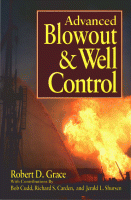Browse content
Table of contents
Actions for selected chapters
- Full text access
- Book chapterNo access
CHAPTER ONE - EQUIPMENT IN WELL CONTROL OPERATIONS
Pages 3-27 - Book chapterNo access
CHAPTER TWO - CLASSIC PRESSURE CONTROL PROCEDURES WHILE DRILLING
Pages 28-83 - Book chapterNo access
CHAPTER THREE - PRESSURE CONTROL PROCEDURES WHILE TRIPPING
Pages 84-112 - Book chapterNo access
CHAPTER FOUR - SPECIAL CONDITIONS, PROBLEMS, and PROCEDURES IN WELL CONTROL
Pages 113-217 - Book chapterNo access
CHAPTER FIVE - FLUID DYNAMICS IN WELL CONTROL
Pages 218-277 - Book chapterNo access
CHAPTER SIX - SPECIAL SERVICES IN WELL CONTROL
Pages 278-317 - Book chapterNo access
CHAPTER SEVEN - RELIEF WELL DESIGN AND OPERATIONS
Pages 318-340 - Book chapterNo access
CHAPTER EIGHT - THE UNDERGROUND BLOWOUT
Pages 341-366 - Book chapterNo access
EPILOGUE - The AL-AWDA Project: The Oil Fires of Kuwait
Pages 367-394 - Book chapterNo access
INDEX
Pages 395-396
About the book
Description
In petroleum industry drilling operations even the most simple blowout can kill people and cost millions of dollars in equipment losses - and millions more in environmental damage and ensuing litigation. Government environmental and safety requirements demand that operating companies and drilling contractor personnel be rigorously trained in well control procedures and in responding to blowouts when they occur.
The book reviews classical pressure control procedures. In addition, specific situations are presented along with detailed procedure to analyze alternatives and tackle problems. The use of fluid dynamics in well control, which the author pioneered, is given careful treatment, along with many other topics such as relief well operations, underground blowouts, slim hole drilling problems, and special services such as fire fighting, capping, and snubbing. Case histories are presented, analyzed, and discussed.
In petroleum industry drilling operations even the most simple blowout can kill people and cost millions of dollars in equipment losses - and millions more in environmental damage and ensuing litigation. Government environmental and safety requirements demand that operating companies and drilling contractor personnel be rigorously trained in well control procedures and in responding to blowouts when they occur.
The book reviews classical pressure control procedures. In addition, specific situations are presented along with detailed procedure to analyze alternatives and tackle problems. The use of fluid dynamics in well control, which the author pioneered, is given careful treatment, along with many other topics such as relief well operations, underground blowouts, slim hole drilling problems, and special services such as fire fighting, capping, and snubbing. Case histories are presented, analyzed, and discussed.
Details
ISBN
978-0-08-054581-3
Language
English
Published
1994
Copyright
Copyright © 1994 Elsevier Inc. All rights reserved.
Imprint
Gulf Professional Publishing
